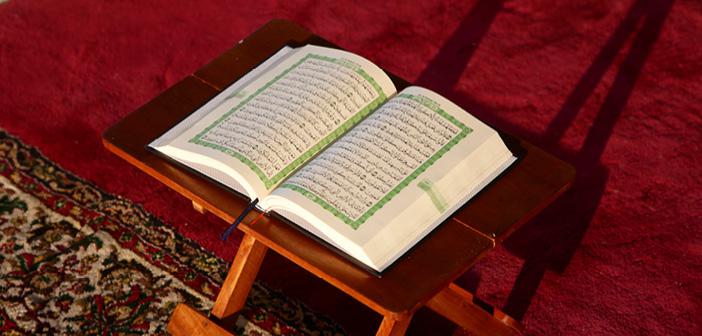
Remorse And Repentance
What is the remorse in islam? What is the repentance in islam?
The world is a place of trial and human beings have therefore been given the capability to do both good and evil. Man’s character takes shape according to whichever side of these capabilities he develops.
It is part of human nature to thank a person, even if it be in return for a favor as small as half a glass of water. This indicates the degree of gratitude we should have for the countless blessings that Allah has given us. Man would only dishonor himself, if he were to yield to his ego and turn a blind eye to all the things Allah has blessed him with.
Man sways towards sin, after he succumbs to his ego and loses the light of faith in his heart. Without moral support, his conscience loses its spiritual depth and ability to think clearly. He becomes gullible and vulnerable. Sins assume an affable appearance, like a sweet melody, and are committed without the slightest weight of concern.
The sins man commits as a result of his blind affection for the world damage his honor and dignity as a human being and darken his spirit.
Yet, man is born innocent and opens his eyes into the world free of guilt. Religion is a divine blessing to ensure that he retains that natural innocence as he matures. We need to keep this in mind to tear open the veil of ignorance that blocks our vision and feel the guilt of sin deep in our conscience. We need to remember it to awaken the sleeping emotions of virtue from within. It will then allow us to turn to Allah with hearts burning with remorse and eyes flooded with warm tears. This remorse is called tawbah. The prayers of forgiveness that overflow from the heart and raise palms to Allah, are called istighfar.
Allah (jj) is pleased with seeing his servants feel remorse and pray for forgiveness. That is because He carries the names Rahman and Rahim, the Merciful and the Compassionate.[1] He also says:
“Allah loves those who are constantly repentant and loves those who purify themselves.” (Al-Baqarah, 2: 222)
Allah’s mercy and compassion for human beings is incomparably greater than even a mother’s love for her child. Allah does not want to punish man; but man deserves punishment if he stubbornly insists on injustice and ingratitude. According to the precedence Rahman and Rahim have over other Divine names, Allah’s mercy is much greater than His wrath, as is beautifully described in the hadith below:
“Think of a wayfarer who, while travelling on camelback in the middle of a desert, has his camel run off on him along with his food and drink; he then runs to and fro in search of it but to avail, and in despair, sees no other option than to lie down on the sand and wait for death to take hold of him…when suddenly he parts his eyelids and sees his camel right next to his feet. He then feels a happiness much greater than he could ever feel, wants to thank Allah, but jumbles his words in excitement, and says, ‘Allah…you are my servant and I am your lord’.
The satisfaction that Allah feels whenever one of you repents is far greater than that.” (Muslim, Tawbah, 7; Al-Tirmidhi, Qiyamah, 49)
Everything in the universe is soaked up in Allah’s mercy.
“My mercy encompasses all things.” (Al-Araf, 7: 156) The mercy that Allah has for human beings is unimaginable. The Prophet (saw) confirms that in a hadith qudsi, which reads:
“My mercy has definitely exceeded My wrath!” (Al-Bukhari, Tawhid, 15)
Because of that, the prophets persistently invited their people to repent.
Apart from prophets, no-one is innocent. Each person is flawed by nature and always runs the risk of falling into sin. Repentance is therefore key. The Qur’an even contains a chapter called ‘Tawbah’, which alone expressed the need for us to turn to Allah in remorse for our mistakes. The Qur’an mentions the word ‘tawbah’ more than eighty times. Again, in addition to hundreds of places where Allah promises He will forgive those who repent, the divine names ‘Ghafur’ (the Forgiver), ‘Ghaffar’ (the Persistenly Forgiving) and their derivatives are mentioned nearly a hundred times. On each occasion, they encourage remorse and repentance; and they are coupled with the promise that Allah will forgive those who do.
Wisdom requires a feeling of guilt over a sin, while the conscience makes it necessary to ask Allah for forgiveness. Being carefree about a sin and not even realizing the need to turn away from it, is a symptom of a total failure of the heart and a journey towards hell; and may Allah (jj) protect us all from that. His warning does not leave much to imagination:
“And whoever does not repent - then it is those who are the wrongdoers.” (Al-Hujurat, 76: 11)
The Prophet (saw) also states:
“Remorse for a sin is repentance right there. After one repents for a sin, it is like he never committed it to begin with”. (Ibn Majah, Zuhd, 30/4252; Suyuti, Jamiu’s-Saghir, II, 161).
However, with that said, a person should not delay repenting with a confidence that Allah will forgive him anyway. He should repent immediately, which is needed for the repentance to be accepted, as is indicated by the Qur’an:
“The repentance accepted by Allah is only for those who do wrong in ignorance and then repent soon after. It is those to whom Allah will turn in forgiveness, and Allah is ever Knowing and Wise” (Al-Nisa, 4: 17)
And that is followed by a notice to those who listen to the devil and postpone repenting:
“But repentance is not accepted of him who continues to do evil deeds up until death comes to him and he says, ‘Now I repent’; or of those who die while they are disbelievers. For them We have prepared a painful punishment.” (Al-Nisa, 4: 18)
Some scholars have therefore said, “Catch up with repentance before death catches up with you”. (Munawi, Fayz’ul-Qadir, V, 65).
It is also not enough for just the tongue to express the remorse. It is necessary for the heart to quiver with guilt. One also needs to put in effort not to commit the same mistake again.
Rumi explains the state of mind needed for repentance to be genuine:
“Repent with a heart burning in the flames of remorse and moist eyes…for flowers bud only in sunny and wet soil.”
Remorse and repentance deliver both individuals and society to salvation. The Prophet (saw) offers us the outlook we should all adopt:
“If Muslims knew just how fierce Allah’s punishment was, they would lose hope in paradise. If non-Muslims knew just how vast Allah’s mercy was, they would have every hope of entering paradise.” (Muslim, Tawbah, 25)
Every Muslim should therefore live between fear and hope; so much so, that if the word got out that only one person was destined for hellfire, he should fear that person might be him. Contrarily, if he heard that only one person would enter paradise, he should be hopeful that he might be that person.
There are levels of fear, just as there are levels of love. Sinners fear Allah’s punishment, while saints fear losing His love.
It should be remembered that even prophets committed minor blunders. They suffered the anguish and remorse of those blunders and, in that way, were made to experience human vulnerability. That is because absolute superiority belongs only to Allah (jj). Only He transcends vulnerability.
The first prophet to repent was Adam (as). The Qur’an retells the words he and Eve pronounced at that moment:
“Our Lord, we have wronged ourselves, and if You do not forgive us and have mercy upon us, we will surely be among the losers.” (Al-Araf, 7: 23)
And their prayer offered a brilliant blueprint for their generations to follow.
Allah (jj) gives His servants the wonderful news that He will forgive them on the condition they accept His invitation to repent:
“Except for those who repent, believe and do righteous work. For them Allah will replace their evil deeds with good. And ever is Allah Forgiving and Merciful. And he who repents and does righteousness does indeed turn to Allah with accepted repentance.” (Al-Furqan, 25: 70-71)
“And those who, when they commit an immorality or wrong themselves, remember Allah and seek forgiveness for their sins - and who can forgive sins except Allah? - and do not knowingly persist in doing wrong. Their reward is forgiveness from their Lord and gardens beneath which rivers flow, wherein they will abide eternally; and excellent is the reward of the righteous workers” (Al Imran, 3: 135-136)
The verse informs that pious souls do not insist on their sins and are quick to seize the ropes of repentance. It is because they are well aware that:
“There is no such thing as a small sin that comes with insistence and no such thing as a great sin that comes with repentance”. The Qur’an tells us:
“Do they not know that it is Allah who accepts repentance from His servants and receives charities and that it is Allah who is the Accepting of repentance, the Merciful?” (Al-Tawbah, 9: 104)
“Say, ‘What would my Lord care for you if not for your supplication?’” (Al-Furqan, 25: 77)
What is important in prayer is piety, love and sincerity. Genuine prayers are expression of love. The above verse states that person gains value in the sight of Allah only through a genuine prayer made with love. Hence, one’s repentance must come deep from the heart. The Qur’an further says:
“O, you who have believed…repent to Allah with sincere repentance. Perhaps your Lord will remove from you your misdeeds”. (Al-Tahrim, 66: 8)
“Except for those who repent, correct themselves, hold fast to Allah, and are sincere in their religion for Allah, for those will be with the believers. And Allah will give the believers a great reward.” (Al-Nisa, 4: 146)
“Allah wants to accept your repentance, but those who follow their passions want you to digress into a great deviation.” (Al-Nisa, 4: 27)
Even if one tries his best to stay away from sin, he cannot be exempt from the duty of repenting, inasmuch as it is impossible for him to properly thank Allah for all that He has given. This applies to everyone. Even if one presumably managed to properly thank Allah, that itself would be a blessing that would require another show of gratitude. The debt of gratitude would regenerate itself forever.
But the fact is it is almost impossible for man to keep a distance from sinning altogether. It is part of his fabric. He has got to sin, realize how weak he is as a result and turn to Allah. How much he feels his nothingness compared to the Lord depends on the quality and depth of his prayer. The Prophet (saw) said:
“The son of Adam sins every day…but the best of sinners is the one who repents.” (Ibn Majah, Zuhd, 30/4251)
Not even prophets are immune to mistakes, however small they may be. They, too, have erred from time to time and have turned to their Lord in repentance. Again, the Prophet (saw) says:
“There are times when my heart becomes veiled…but I repent to Allah a hundred times a day.” (Muslim, Dhikr, 41; Abu Dawud, Witr, 26)
“By Allah, I pray more than seventy times a day to be forgiven.” (Al-Bukhari, Daawat, 3; Al-Tirmidhi, Tafsir, 47; Ibn Majah, Adab, 57)
Yet, the Prophet’s (saw) repentances were not so much for a mistake than they were about gaining greater intimacy with the Lord and acquiring His pleasure. Also, because the Prophet (saw) was constantly progressing on the spiritual path, whenever he reached new heights, he would repent for the comparatively lower level he had been in before. He has taught believers a number of ways to repent. The most important of them is known as sayyid’ul-istighfar, or the king of repentances.
Shaddad ibn Aws (ra) narrates it from the Prophet (saw) himself:
“The best repentance is when a person says:
“Allah…You are my Lord and there is no god but You. I am Your slave and I remain true to the word and oath I have given You best as I can. I seek refuge in You from the evils of the mistakes I have wrought with my own hands. I thankfully pay homage to all the things You have blessed me with, hereby in Your presence. I admit to my sins and ask that You forgive me…for there is no-One else but You who can forgive my sins.”
The Messenger of Allah (saw) went on to say:
“Whoever says this prayer sincerely from the bottom of his heart in the day and dies before nightfall, will enter paradise. Whoever says this prayer sincerely from the bottom of his heart in the evening and dies before dawn, will enter paradise.” (Al-Bukhari, Daawat, 2, 16; Abu Dawud, Adab, 100-101; Al-Tirmidhi, Daawat, 15; Nasai, Istiadhah, 57)
We cannot imagine, let alone count, Allah’s blessings. The Qur’an declares:
“And He gave you from all you asked of Him. If you should count the favors of Allah, you could not enumerate them.” (Ibrahim, 14: 34)
Prominent scholar Ata ibn Abi Rabah, who was able to see many of the Prophet’s (saw) companions, relays an incident that offers a glimpse into the Prophet’s (saw) awareness to repent:
“I once asked Aisha (ra) about an action by the Prophet’s (saw) that she admired the most.
‘Did he ever do anything that was not admirable?’ she said. ‘But there was one night, when he came to my bed, laid down a bit and said, ‘Allow me to get up and worship my Lord for a while’.
I said, ‘Honestly, I would love to spend time with you but I would love it more for you to do what you wished’.
He then got up to take wudu. As he stood to pray, he began to weep. He wept so much that his chest quickly became bathed in tears. He kept on weeping as he bowed, and again as he prostrated. He wept some more as he raised his forehead from the ground. This continued all the way until Bilal (ra) called out the adhan for the dawn prayer. Bilal, too, noticed that the Prophet (saw) had cried and he could not help but ask:
“Why do you cry this much, Messenger of Allah, when all your past and future sins have already been forgiven?
“Shouldn’t I be servant who properly thanks his Lord?” he replied. “By the name of Allah, I received such a revelation tonight, that shame on those who read it without contemplating it”. He then went on to recite:
“Indeed, in the creation of the heavens and the earth and the alternation of the night and the day are signs for those of understanding…who remember Allah while standing, sitting or lying on their sides and give thought to the creation of the heavens and the earth, saying, ‘Our Lord, You did not create this aimlessly; exalted are You above such a thing…protect us from the punishment of the Fire’” (Al Imran, 3: 190-191) (Ibn Hibban, II, 386)
With those words, the Prophet (saw) is telling us that blessings from Allah should increase the amount of gratitude we should feel, not decrease it.
The above verses stress the need to do three things: to contemplate the might and majesty of Allah (jj), to feel utterly helpless in the face of it, which naturally leads to a third – to seek refuge in Him in prayer and repentance.
The night these verses were revealed, the Prophet (saw) shed so many tears until dawn that they would have made the stars in the skies envious. The tears of believers are jewels of the night, lanterns in the dark grave and dews of the gardens of paradise.
Daybreak is the best time to repent. Allah tells us that people who will abound in eternal rewards will be those who revive their dawns:
“They used to sleep but little of the night. And in the hours before dawn they would ask forgiveness.” (Al-Dhariyat, 51: 17-18)
“And those who spend part of the night to their Lord prostrating and standing in prayer.” (Al-Furqan, 25: 64)
Just as the sun breaks through the night at dawn, repentances at that time tear open the darkness of sin and deliver us to the sunshine of divine compassion.
May the Almighty make our hearts alert and grant us an endless life of joy in His land of mercy.
Amin…
[1]. Rahman: He who possesses a mercy unimaginable. Rahim: He who shows mercy and delivers that mercy to entire creation.
Source: The History of Prophets in Light of The Qur’an, THE CHAIN OF PROPHETS, Osman Nuri TOPBAŞ, Erkam Publications
The Creation of Eve














